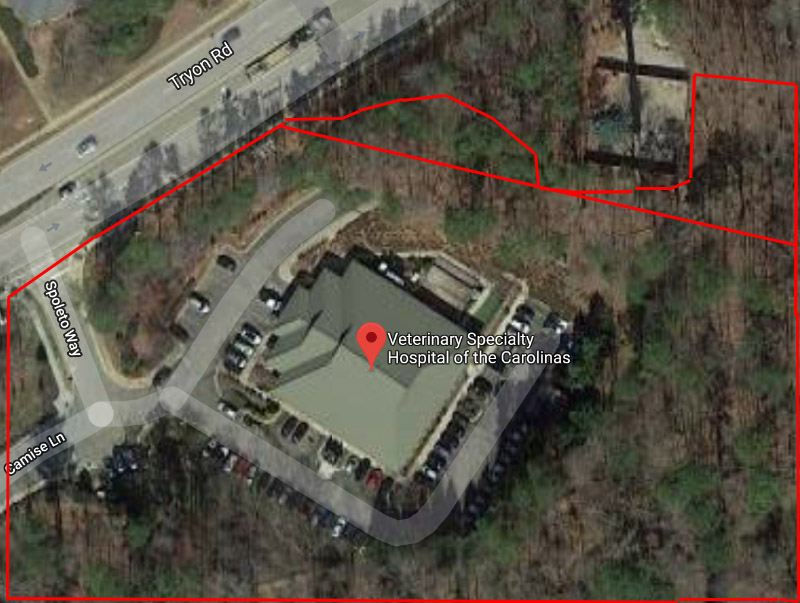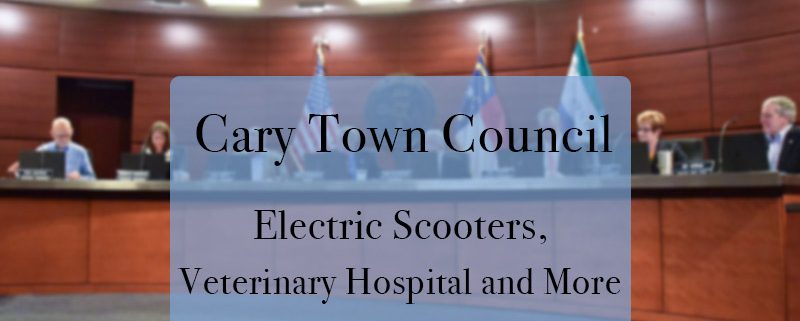Cary Town Council: Electric Scooters, Veterinary Hospital and More
Cary, NC – While the latest Cary Town Council meeting did not have a long agenda, Town Council and public speakers had a long discussion about stormwater and light pollution at a new planned parking lot, while also voting on a new town grant and rules regarding electric scooters that have grown in popularity.
Veterinary Hospital
The item on the agenda at the Thursday, December 13, 2018 meeting that saw the most discussion was a rezoning of land for the Veterinary Specialty Hospital of the Carolinas at the intersection of Cary Parkway and Tryon Road. The hospital owners bought part of adjacent land zoned R-40 residential and want to rezone it to be Office and Institutional land. They put conditions in place that would limit the land they bought from the R-40 portion can only be used for parking, with plans to add more than 100 spaces.
Other conditions include height limits on lights in the parking lot, no waste removal between midnight and 7 AM and rules about a fence around the property. A representative for the applicant said their only goal is to get the parking because they are reconfiguring the hospital and expect more patients and staff coming in. They do not plan on expanding the building itself, he said, though there is no condition in place limiting their square footage.

The approximate location of the rezoning, with the new land for parking marked above. There is an existing cell tower on the above property.
The hospital is near neighborhoods and apartment buildings and two neighbors came out to speak at the meeting. Both brought up concerns about increased stormwater, as there is already flooding in the area. They also said light pollution could be a problem, particularly because of the higher elevation of the hospital and parking lot compared to the surrounding homes. One speaker also questioned why a veterinary clinic would need so many parking spots (the hospital is not only a clinic and is considered one of the top animal oncology hospitals in the country, in addition to specializing in radiology and internal medicine).
Mayor Harold Weinbrecht talked about Cary’s standards for developers to limit stormwater for up to a 10-year storm event, although one town staff member said the developer could “easily” accommodate for a 50 or even 100-year storm event on this land, though the town cannot require that. Weinbrecht also said Cary has strict standards for limiting light pollution and where light can be pointed, although without a site plan, it is harder to know how light would impact neighbors.
In response to neighbors’ concerns about stormwater, Councilmember Jack Smith also brought up how Cary is currently working to improve infrastructure around Vinecrest Court, which town staff said would fix that area’s stormwater problem in 2019.
This rezoning went to the Planning and Zoning Board for their recommendation.
Other Public Hearing
There was only one other Public Hearing on the agenda, which would rezone one R-40 parcel with a house currently on it to R-20 Conditional Use, located along Holly Springs Road. This would effectively cut the parcel in half and add one more house, all adjacent to the Camden Forest subdivision. According to town staff, North Carolina law would make this land normally exempt from subdivision ordinances, but the developer still came before Town Council for the rezoning and included conditions.
These conditions would limit the land to only two dwellings, one of which is already on the property. There would also be a rear setback of 50 feet and a rear landscape area of 10 feet. There would also be a dedicated right of way along Holly Springs Road.
The applicant, a realtor, addressed Town Council and said his plan is just to add one more house to this land. He also pointed out that the surrounding zonings are R-12 so this is less dense.
Councilmember Don Frantz pointed out how this applicant did not need to come to Town Council for the rezoning and thanked him for doing so.
“At the end of the day, we’re talking about approving the subdivision of a lot to add one more house,” Frantz said.
The rezoning went to the Planning and Zoning Board for their recommendation.
Discussion Items
With the popularity of electric scooters, particularly rentable electric scooters, in the Triangle and in Cary as well, Town Council met for the first time to vote on amending the Town Code to address this new technology.
While other cities have done everything from limiting the number of scooters to adding new taxes to banning them temporarily, the Cary change only says the scooters can not be parked so that they block, for example, sidewalks, walkways, entrances, handicap curbs and bus shelters. It also says town staff have the authority to move scooters blocking obstructions as necessary.
Town Council complimented themselves and staff for not having too reactionary of a response and as the North Carolina General Assembly takes up electric scooters now, Councilmember At-Large Ed Yerha said he expects the council will return to this topic once they have made their decision.
Mayor Pro Tem Lori Bush also said the rules about electric scooters are further evidence for why Cary needs protected bike lanes, as these vehicles are not meant for sidewalks but are also not currently safe on roads. Town Council voted for the Town Code change unanimously.
The only other Discussion Item was a vote on whether to accept a $300,000 grant from the Southeast Sustainable Communities Fund, given to only six towns in the South, to combat stormwater in the Walnut Creek watershed while partnering with Step-Up Ministry and Dorcas Ministry to give jobs to economically vulnerable people.
As Councilmember Jack Smith put it, “Why would we not accept $300,000?” Town Council voted to accept the grant unanimously.
Public Speaks Out
There were three speakers at Public Speaks Out this meeting. One was a local architect who showed plans for a 5.5 acre neighborhood development along Carpenter Upchurch Road. He talked about the plan’s merits but said because this area is in a Special Planning Area, they cannot file for the mixed use rezoning they would need to build.
Another speaker spoke in favor of a rezoning case for an office off of Green Level West Road. She said it would help build up local businesses and support Cary’s business climate.
The final speaker identified herself as a representative of the Reserve neighborhood and spoke in favor of more traffic circles in her area and around Cary to manage traffic.
Awards and Recognitions
The meeting started with a talk from a member of the Pinehurst chapter of the Daughters of the American Revolution, talking about laying a wreath at the memorial for Walter Hines Page in Westminster Abbey in London, England. Page, son of Cary founder Frank Page, was the United States’ ambassador to the United Kingdom and was instrumental in convincing President Woodrow Wilson to enter the United States in World War I in support of the Allied Powers. This year is the 100 year anniversary of Page’s death, as well as 100 years since the end of World War I.
This meeting also awarded the Employees and Team of the Year Awards for Cary. Employees of the Year were Betsie Winokur from Public Works and Dan Clinton from Water Resources. The Team of the Year was the ACEs Team, which is a mixture of police detective and Parks, Recreation and Cultural Resources staff who try to engage children to reduce crime. The team includes detectives Armando Bake and Elizabeth Pearson and Parks and Recreation staff Rachel Baranski and Sam Trogdon.
Karen Mills with Cary’s finance staff also presented Cary’s Comprehensive Annual Financial Report, which shows savings to taxpayers of more than $8 million.
Story by Michael Papich. Photos by Hal Goodtree and Google Maps.




E-scooters are not bicycles, they are motorized vehicles requiring a slightly different skill set than a bicycle to ride. Reports from other cities show it is also more likely someone will attempt to ride an e-scooter than a bicycle while intoxicated. Reports from Salt Lake City, and other cities where e-scooters have been in use for a while, are showing a marked increase in Emergency Room visits due to scooter accidents, 161% in the case of Salt Lake City. So I would hope any rules passed by the State, County, or the Town would address safety equipment for e-scooter riders, as well as operating while impaired.
I applaud Mayor Pro Tem Bush’s suggestion of protected bike lanes. Protected bike lanes in downtown would open bike travel to businesses for any family inside the Maynard Loop. There are many well documented economic development benefits to protected bike lanes. https://www.strongtowns.org/journal/2018/5/31/how-bike-lanes-benefit-businesses
This. The only road currently planned for cycle tracks in Cary is the stretch of West Chatham between Cary Parkway and Old Apex, where regular striped bike lanes exist already.
I recognize that cycle tracks are difficult to build outside of full street reconstructions. Striped bike lanes where there is room are a good first step.
I am glad Cary is being friendly to scooters. They came in handy for me today. I got off the 300 bus at the train station at about 5:33 this afternoon and would have had to wait 27 minutes for the next route 4 bus home. There was a Bird sitting right there on the platform. 4 miles, 5 dollars, 25 minutes, and a lot of fun later, I was home, 30 minutes sooner than I would have been if I had waited for the bus. I bike the same route often, and the scooter was a bit slower but not much. The lights are bright and quite visible. The scooter could do about 20 going downhill, 10 going uphill, and 15 on the level. You feel safe on a bike going quite a bit faster than that on a downhill, but I wouldn’t want to go any faster than that on a scooter. They really are a useful means of transportation. Can anybody answer whether or not they are allowed on greenways in Cary?
read the rules!
https://www.townofcary.org/recreation-enjoyment/parks-greenways-environment/greenways/general-information
Motorized vehicles are not allowed on trails.
And, don’t slip on any sharrow paint! ;-)